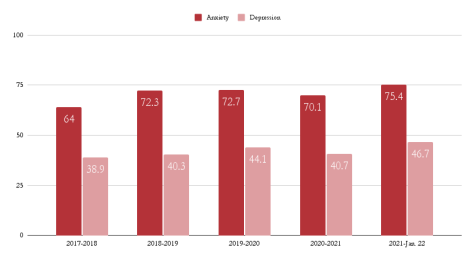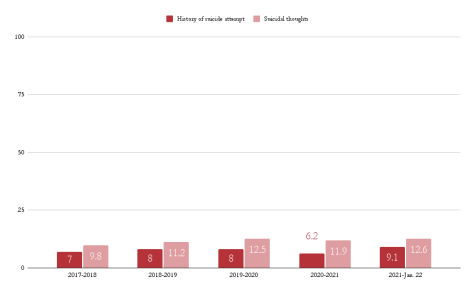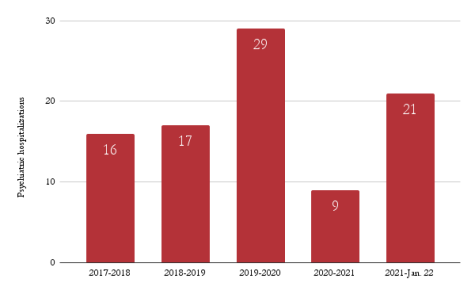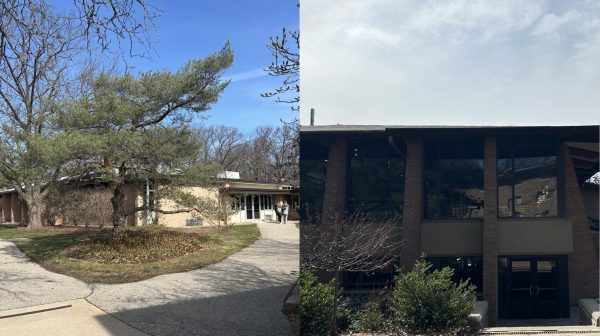State of the Student: The Center for Counseling & Wellness
State of the Student is a report compiled by Vice President Sarah Visser to give Faculty Senate a sense of current trends in students’ mental health needs. Chimes has highlighted different categories of the data provided over the past month. This installment focuses on the CCW.
Almost 400 students (12% of the student body) have visited the Center for Counseling and Wellness this academic year. Operating on a staffing deficiency, the CCW has found ways to maximize their staff’s time and continue to reach students effectively with a stepped care model that emphasizes a holistic approach to mental health.
Increasing demand
Of the students who have visited the CCW so far this academic year, 9.1% had a history of a suicide attempt, 12.6% reported suicidal thoughts in the two weeks prior to their visit and 5.4% reported self-injurious behavior. The rates of students reporting having experienced anxiety (75.4%) and depression (46.7%) in the last two weeks have been steadily increasing for the last five years, except for a slight reduction in 2020-2021. This year’s rates of anxiety and depression are the highest they have been since at least 2017.

According to Dr. Irene Kraegel, director of the CCW, this increase has a lot to do with decreasing stigma. “The prevailing view is that, while there are some increases in depression and anxiety and suicidality, a big portion of this increase has to do with students talking more openly about it as compared to the past,” Kraegel said.
Psychiatric hospitalizations have increased over the last decade: from nine in 2013 to 29 in 2019. There have been 21 so far this school year. According to Kraegel, the increase is at least partially due to an emphasis on prevention. “There’s been a lot of focus on getting people help, taking it seriously if someone makes either a passive or an active comment about suicide and making sure that we don’t just turn a blind eye and assume it will be okay,” Kraegel said. Like rates of anxiety and depression, hospitalization rates decreased in 2020-2021.
The pandemic
Decreases in mental health struggles during the first year of the pandemic, Kraegel said, can perhaps be attributed to people being less busy or to the emphasis many put on mental health during that time. “There was a lot of focus on crisis hotlines and active coping skills to deal with the stress of the pandemic,” Kraegel said. “We all struggle all the time but during the pandemic somehow people felt more permission to talk about those struggles. And that’s a really powerful part of emotional wellbeing — knowing we’re not alone and not judging our emotional struggles.”

Throughout the pandemic, Kraegel said she has been inspired by the resilience of Calvin students. “I don’t want us to lose sight of mental health as also including flourishing,” she said. “I think if we can continue to do both of those — to recognize the suffering and the struggling and the challenges that we face and also celebrate our resilience at the same time, including for students here, I think that will serve us well.”
Meeting needs while short-staffed
Counseling centers across the nation are short staffed, according to Kraegel, and the CCW is no exception. Switching to mostly part-time positions has made space in the CCW budget to hire more staff and increase available hours, but this also creates more positions to fill, Kraegel told Chimes.

The CCW has adapted by maximizing counselor hours during the academic year and relying on their stepped care model, which “emphasizes short-term treatment approaches for individual therapy, and then long-term treatment in the form of groups,” Kraegel said. The CCW routinely refers students to on-campus treatment groups, as well as to Therapy Assistance Online, both of which use evidence-based Cognitive Behavior Therapy.
Kraegel said group therapy can be an ideal setting to work through the symptoms they experience and to engage in a healing process “with other people who get it.” The CCW also offers individual therapy for students who don’t feel ready for a group environment to prepare for that type of treatment.
They have also emphasized collaboration with off-campus resources. “Grand Rapids is a city rich with mental health resources,” Kragel said, and many of them have been eager to work with Calvin students.
Holistic wellness
“Our country thinks about mental health in one way, which is weekly, individual therapy.” While that’s one good option, Kraegel said, “there are many other ways that we can grow in our mental health.”
Kraegel thinks of the CCW’s role as a “hub” for services. “We don’t pretend that we can provide all the treatment that every student needs,” she said. “But we feel very confident that we can connect every student to the treatment that they need.”
The CCW assesses the success of programs like group therapy and Therapy Assistance Online through surveys, as well as qualitative reflections on the experience at groups’ final sessions. Both Calvin-specific and national data, according to Kraegel, support stepped care models. And while it’s simply not feasible for the CCW to provide free weekly unlimited individual therapy for every student, the center is prepared to connect every student with the resources they need, as well as to prepare students to navigate the broader mental health care system.
According to Kraegel, students commonly have a misconception that the CCW’s referrals to groups and other resources are due to a lack of available counselor hours for weekly individual therapy. But that’s not the case: “When we make a referral to a group, or to a dietician, or to a group fitness class, or encourage students to connect with the career center or campus ministries or walk in the nature preserve, et cetera, that’s because we truly believe mental health is a holistic endeavor,” Kraegel said. “We will always be providing the recommendations that we expect will be the most helpful for you.”






